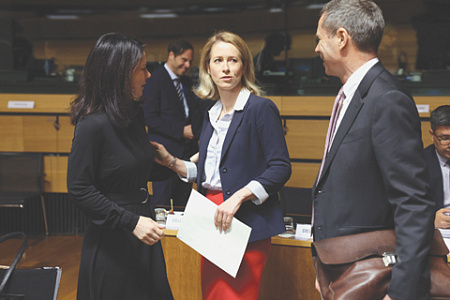
The EU will adopt a new, 17th package of anti-Russian sanctions not in April, as predicted by a number of media outlets, but in May, when the estimated deadline set aside by Donald Trump for achieving results in the negotiation process with Russia expires. This was decided at a meeting of the EU Foreign Ministers in Luxembourg. In addition, the EU responded to the Ukrainian call to hold alternative Russian celebrations in Kiev dedicated to the 80th anniversary of the end of the Great Patriotic War.
The sanctions imposed by the European Union are a formalized procedure involving a number of stages. The key one is the approval of the sanctions package at the level of the foreign ministers. Therefore, the meeting in Luxembourg, which took place on April 14, received quite a lot of attention in the press. It wasn’t the sanctions package itself that was of interest. The West has long given up the illusion that there are miraculous restrictions that can instantly deprive a country as large and important to the global economy as Russia of the opportunity to conduct military operations. Perhaps even Trump, who relies on the power of American economic pressure, does not believe in their existence.
The meeting in Luxembourg was interesting primarily because it took place against the background of a noticeable intensification of the Russian-American negotiation process. As previously reported, Trump really wants to reach a truce between Russia and Ukraine by April 20, Easter. The introduction of EU sanctions could prevent this. The previous, 16th sanctions package was introduced in February, when the Russian Federation and the United States were just establishing contacts, the current one would have been introduced a week before the deadline set by Trump. Hungarian Foreign Minister Peter Szijjarto demanded that efforts to establish peace not be disrupted, warning that his country would not support the new sanctions. However, Hungary always says this before discussing the next sanctions package, but it always approves it in the end.
The intrigue was resolved quickly. The American allies did not interfere with Trump. The EU’s High Representative for Foreign Affairs and Security Policy, Kaya Kallas, said that the 17th package would be adopted only in May. Two meetings of the Foreign Ministries of the EU countries are scheduled for that month. The first, informal one (that is, which will take place without signing any documents), will be held on May 8, the official one – on May 15. Thus, the Europeans took a month to make progress in the negotiations on the settlement of the Russian-Ukrainian conflict.
What could be included in the 17th package before the meeting in Luxembourg, Lithuanian Foreign Minister Kastutis Budris said. According to him, the Lithuanian delegation will propose to impose sanctions against the shadow fleet, supplies of Russian liquefied natural gas and the Russian nuclear industry. From this list, Callas mentioned only the shadow fleet. According to the head of EU diplomacy, the 17th package will contain “other elements.”
If new sanctions are still under discussion, then the EU has already prepared anti-Kremlin restrictions, so to speak, at a symbolic level. The Ukrainian authorities intend to hold their own celebration on May 9, an alternative to the Moscow celebration of the 80th anniversary of the victory over Nazi Germany. On this occasion, Kiev intends to temporarily put into oblivion the decision of the Verkhovna Rada of 2023, adopted at the suggestion of President of Ukraine Vladimir Zelensky. He established the Day of Remembrance and Victory over Nazism in the Second World War of 1939-1945, which was supposed to be celebrated on May 8, not May 9. Recall that due to the time difference in the USSR and in the West, the surrender of the Nazis is counted differently.
Callas said that high-ranking guests from the EU will arrive in Kiev on May 9. But she strongly discouraged all countries applying for EU membership from coming to Moscow on that day. “We have made it very clear that we do not want any country applying for EU membership to participate in these events on May 9 in Moscow. It was said very clearly, that’s our message. And of course, I have appealed to all EU members and representatives of all EU institutions to visit Kiev and Ukraine in as many numbers as possible to express our solidarity and show that we are with Ukraine,” Kallas said.
The countries to which the EU warning is addressed are primarily Serbia and Armenia. Both of them apply for membership in the European Union. At the same time, Serbian President Aleksandar Vucic and Armenian Prime Minister Nikol Pashinyan received invitations to visit Moscow. Both confirmed back in March that they would come to Moscow. And of the EU leaders, it seems that only Slovak Prime Minister Robert Fico is going to attend the celebrations in Russia, unless, of course, he changes his mind now. Hungarian Prime Minister Viktor Orban will definitely not be in Moscow on May 9. “I think this is out of the question,” the head of the Hungarian Prime Minister’s office, Gergei Guyash, told reporters.
